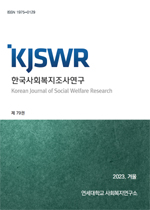A study on the relationship between social value orientation and giving behavior: Application of the zero-inflated negative binomial regression model
A study on the relationship between social value orientation and giving behavior: Application of the zero-inflated negative binomial regression model
- 연세대학교 사회복지연구소
- 한국사회복지조사연구
- 79권
-
2023.12165 - 191 (27 pages)
-
DOI : 10.17997/SWRY.79.1.6
- 186

본 연구는 개인의 사회적 가치지향의 수준이 나눔행동에 미치는 영향력을 확인하고자 수행하였다. 이를 위해 한국나눔교육포럼이 전국 거주 만19세 이상 성인남녀 1,037명을 대상으로 조사한서베이 데이터를 활용해 분석하였다. 사회적 가치지향은 Deutsch(1958)의 분류에 따라 공동체의이익 추구, 결과의 평등 추구, 타인과 사회를 위한 가치로 살펴보았으며, 가치 수준이 자원봉사참여행동에 미치는 영향을 확인하였다. 분석방법으로는 종속변수의 분포를 기준으로 두 개의 회귀방정식을 동시에 추정할 수 있는 영포화 음이항 회귀모형을 사용하였다. 영포화 모형의 분석 결과, 결과의 평등을 추구하는 사람일수록 자원봉사에 참여하지 않는 그룹에 속할 확률이 높은 것으로나타났다. 반면, 타인과 사회를 위한 가치를 추구하는 사람일수록 자원봉사에 참여하는 그룹에속할 확률이 높은 것으로 나타났다. 음이항 모형의 추정결과, 결과의 평등 추구, 타인과 사회를위한 가치의 추구 수준이 높을수록 연간 자원봉사활동 시간이 유의미하게 높은 것으로 나타났다. 본 연구는 일반시민들을 대상으로 사회적 가치지향이 실제 나눔행동에 미치는 영향을 영포화 음이항 회귀모형을 적용하여 실증적으로 분석했다는 점에서 의의를 갖는다.
This study was conducted to examine the effect of an individual's level of social value orientation on giving behavior. For this analysis, data was collected from the Korea Philanthropy Education Forum among Korean adults(n=1,037). Social value orientation was categorized according to Deutsch(1958) as the pursuit of communal benefits, the pursuit of equality of outcomes, and the valuation of others and society. The influence of these value levels on volunteer participation behavior was observed. The zero-inflated negative binomial regression model, which estimates two regression equations simultaneously based on the distribution of the dependent variable, was employed as the analysis method. According to the zero-inflated model analysis, those who pursued equality in outcomes were more likely to belong to the group that did not participate in volunteering. On the other hand, those who pursued valuation of others and society were more likely to belong to the group that engaged in volunteering. Based on the negative binomial model estimation, as the pursuit of equality of outcomes and the pursuit of valuation of others and society increased, the annual volunteer activity time was significantly higher. This study holds significance in that it empirically analyzes the influence of social value orientation on actual giving behavior among the general public by applying the zero-inflated negative binomial regression model.
I. Introduction
II. Theoretical Background
III. Research Model and Method
IV. Findings
V. Discussion
References
(0)
(0)